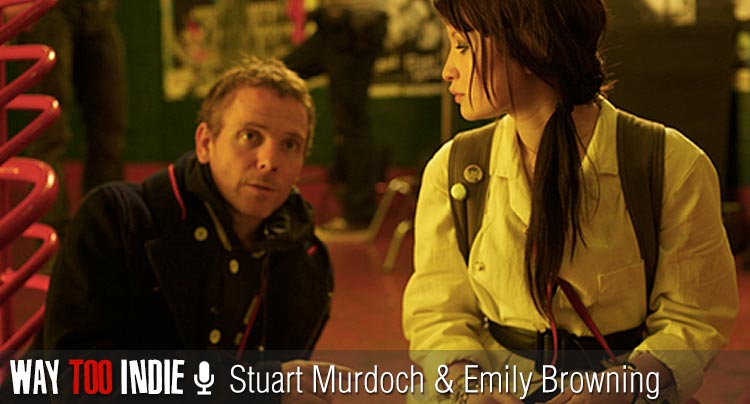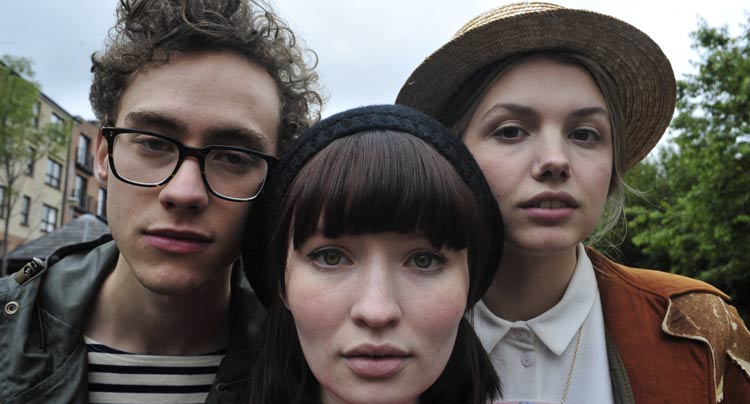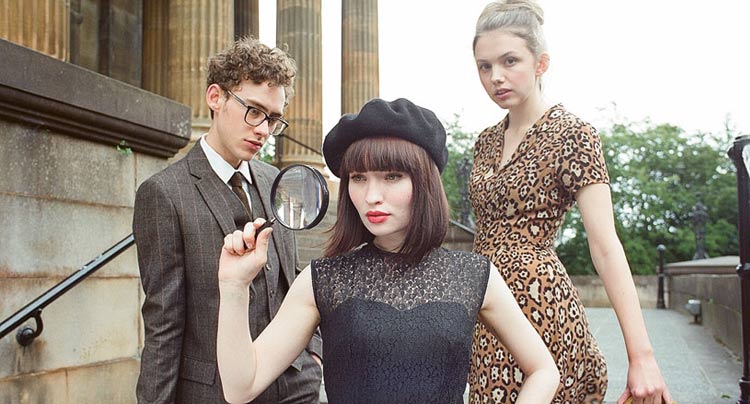‘God Help The Girl’ director Stuart Murdoch & star Emily Browning Had a “Skype-Off”

On Stuart Murdoch’s 46th birthday, an early morning chat with media members failed to best his favorite gift. “I must admit my highlight of the day was that my wife sent me a birthday greeting with my wee boy dancing. So that was funny.” Murdoch failed to advertise the date to even his new film’s star Emily Browning, joking, “well, once you’re past 50…”
At 46, Murdoch has already fronted an iconic indie pop band in Belle & Sebastian, but now assumes the role of director for the first time with God Help the Girl, based on a concept album he composed with band mates. The movie-musical stars Emily Browning as Eve, a teenage girl with emotional and eating issues, as well as actors Olly Alexander and Hannah Murray.
There are several ways to approach a movie-musical, from what point did you know you wanted to adopt the style used in God Help the Girl?
Stuart Murdoch: There’s never really a point you decide. You quite honestly feel the thing. I know sometimes that thing doesn’t go down too well with inquirers, but the thing is you feel songs. Songs just arrive. You don’t negotiate songs, you don’t think about them too much you just let them happen. And then every song suggests a different tone.
Is it conversational? Is it something that Eve will do straight to camera? Is it like a pop video where we’re all just looking in? They all just had a different tone that was very easily suggested, so the thought’s a little bit of a mongrel.
The one thing I was sure of was that I needed to get it in early. If you’re gonna’ make a musical with young audiences, with kids these days, I was determined that the first thing that would happen was Eve would drop down out of a window, turn to camera and sing her little story of where she’s at right now. And I thought if they accepted that, they would accept her.
Emily, you’ve had experience doing musical stuff, including Suckerpunch, so how was this experience different?
Emily Browning: The movie itself was just completely different. It didn’t even really feel like making a movie. It felt like camp, because me, Hannah and Olly met on the train on the way to Glasgow when we were going there for rehearsals with Stuart. We [Hannah and Olly] were all equally excited and freaked out. We forged a pretty strong bond pretty quickly and it was all kind of just us running around. There were days where we were like, ‘Shit! What can we shoot? Let’s do this little extra scene.’ And Staurt would just give us something. It was so fun and so much more exciting than that kind of regimented, sitting around. There was no sitting around on this film which was really nice and kind of rare.
But in terms of the music, when I was singing for the Suckerpunch soundtrack it was all just in the studio, and we had lots of time, and lots of money. It was very cushy and easy. This was harder for sure, more of a challenge definitely. Just kind of getting to Glasgow, and getting in a room, and Stuart just being, like, ‘Sing it!’
But it was all pretty comfortable pretty quickly I think. I thought that Stuart was going to be like, ‘You need to get singing lessons, you’re awful, I’ve been making music forever, you’re terrible’
Stuart: I picked you out from thousands of people. You’re awful.
Emily: No, but I thought with the singing aspect of it because you’ve been doing it for such a long time you’d be really picky but it was just, ‘Oh that’s good. Cool.’
Stuart: Well, one thing I had the pre-notion of it that it would be like the experience I had making our first record. Belle & Sebastian made a record called Tigermilk, it was a gang of people that came together very quickly. It was done in Glasgow and it was done very quickly and it was rough around the edges. I knew by the time I got all the elements together, this was going to be the three-dimensional equivalent of making our first record with you guys [Emily, Hannah and Olly] being the band.

This film has been a long time coming, was there any benefit to this incubation process?
Stuart: Yeah, incubation, that’s a good word for it. You never plan it. Nobody’s ever planned an incubation before. I don’t know. Maybe if you’re pregnant or something. I never actually sat down and thought, “I’m going to let this sit for a while.” It just took that long, all the various processes it went through…
Did [producer] Barry Mendel convince you to start over at a point in the process? How close is this version to your original conception?
Stuart: I think the good thing about Barry; he was my creative partner and he had an outside view of what the conception would be. In the end it was closer to something truer and nicer for me, because in the end I had someone watching out for me who knew there was more to it than the initial draft. Knew there was more to it than 3 late teenagers prattling on. Which was all the first script was, endless prattle about laundry and things like that.
What was the major reason for Barry’s concerns?
Stuart: It was like France vs. the USA. It was like Hollywood vs. Paris in the 60s. He’s Mr. Hollywood and I’m not saying I’m a new wave sort of guy but I was one guy in a European country who had never made a film before and he felt like the might of Hollywood. Because I’d be working away, and I’d never done it and he said, “Not good enough, you need to blah blah blah.” And I knew he was working with Judd Apatow and the funniest people in the world at the same time. At this crucial point, he said, “It needs to be better.”
Emily: (laughs) That’s refreshing.
Stuart: That set me back a long time. What I did was I went away, and I wrote a new treatment that was actually the story that’s on the original LP. It’s called Eve: An Introduction. It told the story of the kind of darker things that happened to Eve, before the movie was going to happen. That gave me a new place to come from, I knew then where I wanted to start. I knew then the different level of drama that I wanted to bring out because it didn’t have those darker things before. It was a match up, sort of frothy, kind of ‘60s musical before… so fair play to Barry.
What was it like, searching for someone to play Eve?
Stuart: It was long, it was strenuous and I remember Barry had always said that the casting in a film like this was going to be slow approaching. I didn’t really take that in until we started doing it and now you look back…
We were even casting when we made the original album. We did open auditions for the album for singers. I started out just putting notices up. Not mentioning my name or anything, just looking for singers in Glasgow. I always thought we’d get a singer from that, I always thought it’d be easy. I always thought we could get this primal force, this singer that could just drift through the whole project.
I kind of knew that I wanted something else for the film.
Emily: We [her and Olly] did a Skype audition. It was so weird.
Stuart: We had a Skype-off. To me, because I had never done the sort of thing, the Skype-off is perfect. It’s split-screen like a 70s movie and you get to see them on-screen. So there’s another step removed for a fledgling director. And Emily held the screen, she could have held it for 20 minutes without doing anything. That’s where I realized, that’s what I wanted.
Do you remember your audition song?
Emily: Originally it was a song called “Secret Heart” by Feist. I sent that in a year before I got a call back. I was like, ‘this is not happening.’ But then it all kind of happened at once and Stuart made me sing “Musician Please Take Heed” which is the song right at the end of the film and I was like, ‘You really had to give me the most difficult song to sing? Of course they did.’
The 1st time I did it I went to the studio to be put on tape and I had someone there playing music with me and it was all easier. The 2nd time I just did it on my computer in Photobooth and it was terrifying. I sent it thinking there’s no way. ‘This is awful, it’s the worst thing I’ve ever done, there’s no way.’

Were there songs that got cut?
Stuart: Surely there’s stuff like that in every film. I feel like there’s less [in God Help the Girl] we couldn’t afford to do that. Most of the songs that I put on the original LP formed the backbone of the film. So there wasn’t too much that got changed.
A lot of the interpretations in God Help the Girl were very different in the film than on the record. What was the process of creating your adaptations?
Emily: I listened to the record quite a bit before I got the part but then I think it was important for me to try and forget it a little bit. The girls singing on the record are proper singers and I was just like, ‘I can’t try and compare myself to this.’
I feel like without the songs Eve’s a bit of jerk, which I kind of like. I think that’s really good, a female lead that doesn’t have to be so loveable, I think she’s kind of an asshole sometimes, which is great. Because people are assholes. She’s kind of selfish. So I think it was really important that in the songs, she was this cartoon Disney princess of herself, winking at the audience. She’s the most her when she’s singing the songs. She’s in her best, happiest place.
Stuart: I’m glad you agree with me. There was a time when we were doing the music, acting the music and you were standing at the camera going, “Overacting.” And I’m going, “No! Underacting!”
Emily: (laughs) You convinced me. That was uncomfortable at first. I thought, ‘I can’t smile this much. I can’t be this happy and jazz handsy,’ but then I understood and it made sense.
Stuart: I’ve been quoted as saying [A Hard Day’s Night] is the greatest musical film ever made, and I watched it again recently for the 25th time and it’s still the greatest musical film ever made. There’s a complete honesty and delight in their performances every time.
What were your points of reference for the film?
Stuart: American Graffiti is a great one and one that’s a more up to date version of American Graffiti is called Dazed and Confused. You might think these aren’t musicals but American Graffiti’s got more music in it per square inch than anything. They spent half the budget on it. But these were real benchmarks.
There was a specific French film by Truffaut which is called Stone Kisses from 1968. It’s probably my favorite even though 400 Blows t is more famous, Stone Kisses is just wonderful.
There’s an English film called The Railway Children. It got shown so often when we were young it’s almost like The Wizard of Oz for us. And the three kids in it are kind of like Eve, Cass and James.
There’s also an English film called Withnail & I produced by George Harrison. It’s very much like a sleeper hit. Probably with Life of Brian probably the funniest British film ever. There’s an arc to Withnail & I and I was determined that this film would fall within that arc.
